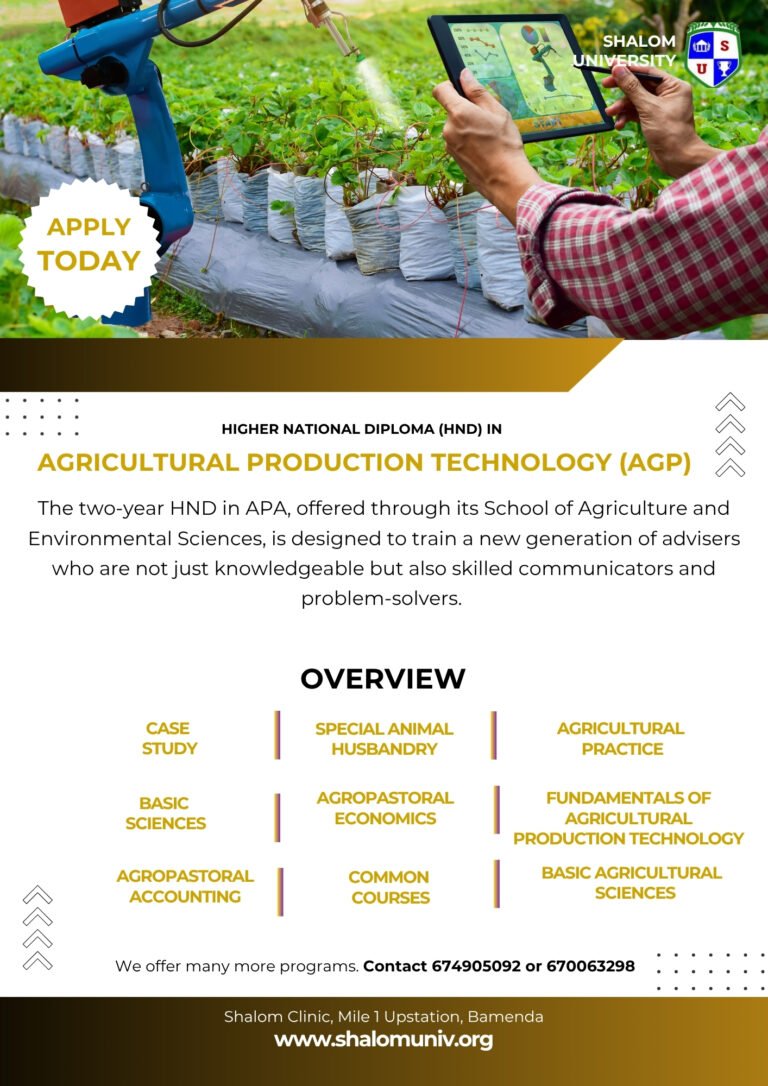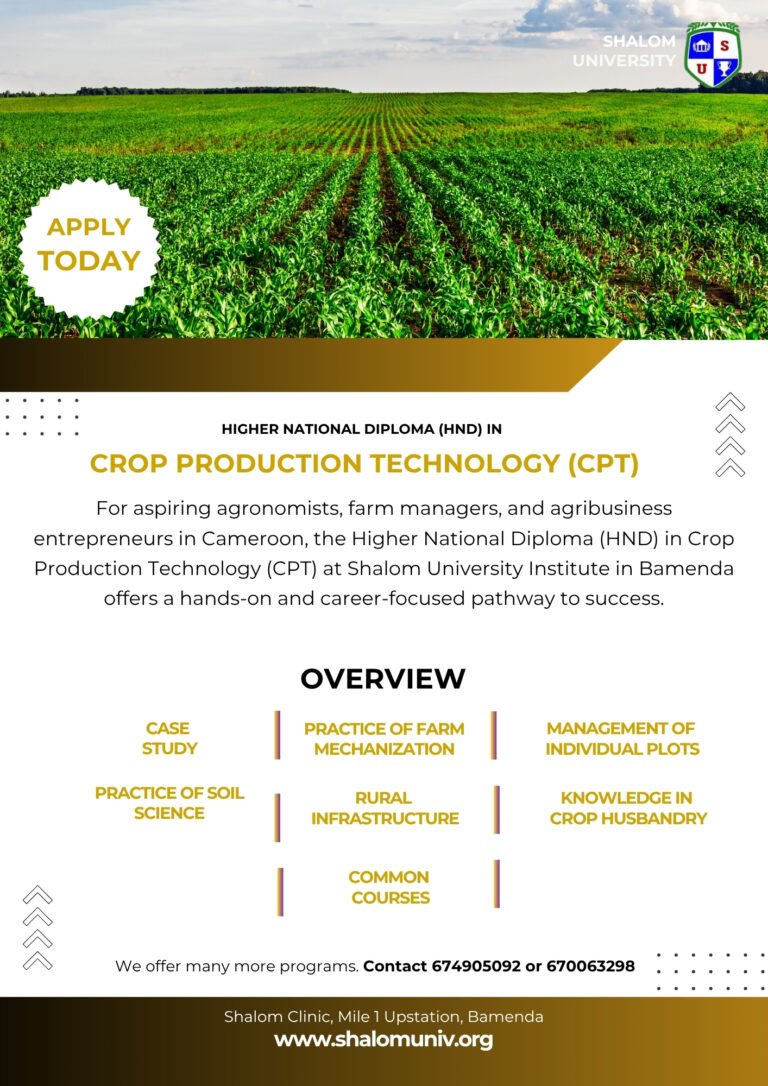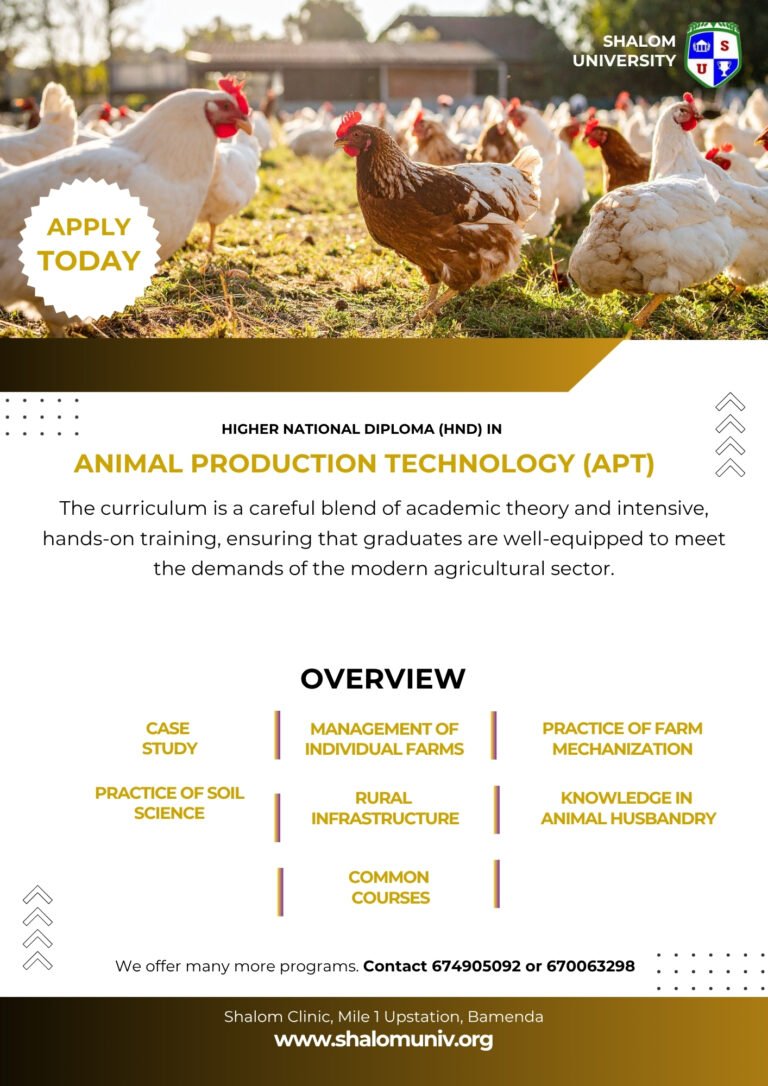In Cameroon, where agriculture and livestock farming form the foundation of countless rural livelihoods, effective knowledge transfer and technical support for farmers and pastoralists are essential for sustainable development. Advisers who can bridge the gap between agricultural research and on-the-ground farming practices play a crucial role in improving productivity, adapting to climate change, and enhancing rural incomes. The HND in Agro-Pastoral Adviser (APA) at Shalom University in Bamenda is specifically designed to train these essential professionals. This program provides aspiring agro-pastoral advisers with the technical knowledge, advisory skills, and contextual understanding needed to excel in Cameroon’s diverse rural communities.
The curriculum at Shalom University is tailored to the Cameroonian context, blending core scientific principles with hands-on training in participatory approaches, communication, and rural economics. Graduates are prepared not only to provide expert advice but also to work collaboratively with farmers and rural organizations, ensuring they are well-equipped to drive positive change in the nation’s agro-pastoral sector.
The APA Curriculum at Shalom University
The HND in Agro-Pastoral Adviser program at Shalom University is structured around a set of core papers that provide a comprehensive and practical education in the field.
Paper: Case Study
The Case Study paper is a vital component that integrates all the theoretical knowledge and practical skills gained throughout the program. It challenges students to analyze complex scenarios within agro-pastoral systems, from addressing a pest infestation in a crop field to managing a herd health issue in a pastoral community. This is particularly relevant for advisers in Cameroon, who must navigate local challenges related to climate variability, market access, and diverse farming practices.
The course trains students to:
- Analyze real-world agro-pastoral challenges: Based on a given case, students evaluate operational bottlenecks, production inefficiencies, or resource management issues faced by farmers or pastoralists in Cameroon.
- Identify critical issues and underlying causes: They pinpoint specific problems related to crop or animal health, soil fertility, water management, or market access and explore the underlying factors.
- Propose evidence-based solutions: Students formulate practical recommendations based on agro-pastoral principles, economic analysis, and participatory approaches. For example, a case study might involve a farming cooperative struggling with low yields and propose a new soil management plan or a post-harvest handling strategy.
- Defend their decisions: During formal presentations, students must justify their analysis and proposed solutions, demonstrating their critical thinking and communication skills, which are essential for effective advisory work and stakeholder collaboration.
Paper: Agro-Pastoral Dynamics and Participatory Diagnosis
This paper provides students with the methodological tools and conceptual framework to understand and work within agro-pastoral systems. It emphasizes participatory approaches, which are crucial for ensuring that advice is relevant and adopted by rural communities.
Key topics include:
- Agro-Pastoral Systems Analysis: Understanding the complex interactions between crops, livestock, and the environment in a given agro-ecological zone.
- Participatory Diagnosis: Techniques for involving farmers and pastoralists in the process of identifying problems, analyzing constraints, and developing solutions.
- Rapid Rural Appraisal (RRA) and Participatory Rural Appraisal (PRA): Hands-on training in using RRA and PRA techniques to gather information and facilitate community-level planning.
- Gender and Social Analysis: Understanding the role of gender, age, and other social factors in agro-pastoral dynamics and decision-making.
Paper: Support and Advice to Farmers and Rural Organizations
This paper focuses on the practical skills and approaches needed to provide effective extension and advisory services to individual farmers and their organizations. It emphasizes building trust, fostering empowerment, and facilitating learning.
The curriculum addresses:
- Extension Methodologies: Various approaches for providing extension services, including group extension, farmer field schools, and individual farm visits.
- Training and Capacity Building: Designing and delivering training programs for farmers and pastoralists on specific topics, such as new crop varieties, pest management, or improved animal husbandry.
- Institutional Support: Providing advice and support to rural organizations, such as farmer cooperatives and pastoral associations, on management, governance, and business development.
- Monitoring and Evaluation of Advisory Services: Methods for monitoring the effectiveness of advisory services and evaluating their impact on farmer livelihoods.
Paper: Communication and Animation in a Professional Situation
Effective communication is the cornerstone of successful advisory work. This paper provides students with the communication skills and animation techniques needed to engage effectively with farmers, pastoralists, and other stakeholders in a professional context.
Key areas of focus include:
- Interpersonal Communication: Developing skills in active listening, empathy, and clear and respectful communication.
- Group Facilitation: Techniques for facilitating group discussions, meetings, and training sessions with rural communities.
- Visual Communication: Using visual aids, demonstrations, and other media to communicate technical information effectively to a diverse audience.
- Conflict Resolution: Strategies for mediating and resolving conflicts that may arise within rural communities or between different interest groups.
Paper: Agropastoral Economics
This paper provides students with a foundational understanding of economic principles and how they apply to agro-pastoral systems. Understanding the economics of farming and herding is crucial for providing sound business advice to farmers and pastoralists.
The curriculum covers:
- Farm Management Economics: Principles of farm management, including resource allocation, cost analysis, and profitability.
- Marketing and Value Chains: The economics of marketing agricultural and livestock products and understanding the different actors in the value chain.
- Microfinance and Credit: The role of microfinance and credit in supporting rural livelihoods and strategies for advising farmers on accessing financial services.
- Rural Development Economics: An introduction to the broader economic issues affecting rural development in Cameroon.
Paper: Agropastoral Accounting
This paper provides students with the basic accounting skills needed to help farmers and rural organizations manage their finances effectively. Financial record-keeping and management are essential for making informed business decisions and securing credit.
The curriculum covers:
- Farm Record-Keeping: Designing and using simple record-keeping systems for tracking production, sales, and expenses.
- Financial Statements: Introduction to basic financial statements, such as income statements and cash flow statements, relevant to agro-pastoral enterprises.
- Budgeting: Developing and using budgets as tools for planning and controlling farm finances.
- Financial Reporting: Communicating financial information clearly and accurately to farmers and stakeholders.
Paper: Basic Sciences (AGE, AGP)
This paper provides students with a foundational understanding of the biological and physical sciences that underpin agriculture and animal production. It covers topics common to both agriculture and animal production programs, ensuring a solid scientific base.
The curriculum covers:
- Soil Science: Basic principles of soil composition, fertility, and management.
- Plant Science: Basic principles of plant biology, crop growth, and pest and disease management.
- Animal Science: Basic principles of animal biology, nutrition, health, and reproduction.
- Ecology: Understanding the ecological principles relevant to agro-pastoral systems.
Empowering Rural Communities
Graduates of the HND in Agro-Pastoral Adviser from Shalom University are well-prepared to enter the workforce in various roles across Cameroon’s agricultural sector. They can serve as extension agents for government ministries, field officers for agricultural NGOs, or technical advisers for farmer cooperatives and pastoral associations. Their proficiency in agro-pastoral dynamics, participatory diagnosis, communication, and economic analysis, coupled with a deep understanding of the Cameroonian context, makes them invaluable assets to rural communities. The Case Study paper ensures that they are not just theoretically sound but also adept at applying their knowledge to solve real-world challenges in the agro-pastoral sector. By providing a comprehensive and contextually relevant education, Shalom University plays a significant role in nurturing the expertise crucial for fostering sustainable rural development, improving food security, and supporting livelihoods across Cameroon.




